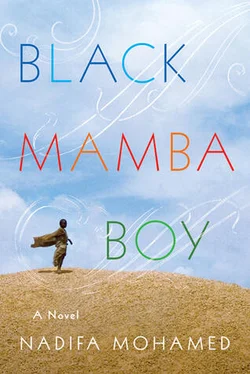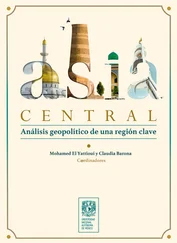Jama and the other tea boys gathered in the market to hear the digested and translated version.
“Should I plant more tomatoes? Will the Ferengis be buying from here or Adi Remoz?” one woman asked.
“Will we get a railway station now?” asked another.
All the young men were hushed; some wondered whether this war would be as ruinous as the invasion of their country, while others wondered if it would be more profitable to become askaris now or later. Five years after they had conquered a country they could not afford to govern, the Fascists wanted the heady glory of another conquest. In Rome, Mussolini the opportunist, the failed elementary school teacher, the syphilitic seller of ideas fallen from the back of a lorry, calculated how many hundreds or even thousands he would need to claim dead before Hitler would deign to cut him a slice of the victory cake. A few thousand, he told his aides, that’s all. Fascist officers toured Italian East Africa touting for the upcoming attraction, and young Somalis, Abyssinians, and Eritreans were tricked, cajoled, and forced into signing up.
Two enlistment officers finally arrived in K’eftya and set up a table outside the new redbrick police station. A long line of men and boys waited to enlist; Jama passed bright-faced twelve-year-olds running away from home, starving rheumy-eyed farmers, shiftas who had betrayed their fellow thieves, strong village men who could not afford dowries. Jama waited in the midday sun until his turn came. The Italians behind the wooden table laughed at the battered cardboard suitcase clenched in his hand, but they also seemed amused by most of the Africans. They asked his name and age, and told him to give them a twirl. Jama was exactly the kind of indigent boy they were looking for, and he put his thumbprint where they told him, for once neither knowing nor caring where they sent him. They issued him a rifle, a shirt, a pair of shorts, a blanket, a kit bag with all kinds of toys, a knife, tin bowls, field dressing, a water flask, more possessions than he had ever owned — and in exchange all they wanted was for him to join something called 4th Company. They even gave him a flour ration and an adult wage of fifty lira a month. With this he was meant to buy sandals, he had long outgrown the pair Amina had given him, and the Italians thought shoes were an optional extra for their askaris. At his tender age he could not imagine grown men sending him to his death; neither could he imagine the kind of mechanized, faceless slaughter the Italians would bring to Africa.
Jama had never seen war; the only battles he could imagine were the sporadic feuds that nomadic Somalis engaged in, played according to a strict set of courtly rules that forbade the killing of women, children, old men, preachers, and poets. He could feel the money being thrown into this conflict and it thrilled him, it felt like a festival was being prepared. Everywhere he looked, lorries filled to bursting zoomed past. More and more Italians appeared in the highlands and then disappeared back to the safety of Eritrea. Tanks and all sorts of strange vehicles trundled along roads feverishly built ahead of them by tired African laborers. Installed in his company with a quiet, well-behaved commander by the name of Matteo Ginelli, Jama awaited orders. The Italian war machine decided that Jama “Goode” Guure Mohamed Naaleyeh Gatteh Eddoy Sahel Beneen Samatar Rooble Mattan would be most useful as a signaler. He crossed the little Eden in between K’eftya and Omhajer once again, this time in a military convoy, and began his training. He fell in love with his first task: he was to write out messages on the ground to planes flying overhead. With huge strips of white cotton Jama spelled out words, memorizing the squiggles and lines of the Roman alphabet by giving them nicknames. A was the house, B was the backside, C was the crescent moon, D was the bow; his favorite was M, which looked like two boys holding hands. Commander Ginelli called Jama “Al Furbo,” the witty one, for his quick grasp of Italian, and the other askaris adopted this as his nickname. While the other boys asked to see the card again and again to replicate the strange symbols written on it, one look and Jama could copy out perfect messages. Even though planes never flew overhead to read these messages, working in the sun, running about, wrangling with the huge sheets in the breeze with other boys shouting for his help made Jama feel capable for the first time in his life. He practiced writing letters in the sand, mastering “Jama,” “ciao,” and his mother’s and father’s names.
When Commander Ginelli brought two new boys to join the signalers, Jama was too engrossed in his messages to bother looking up, but a sharp slap on his shoulder brought him to attention. It took him a second to recognize the face but there stood Shidane, taller than him now and with a shaven head, chewing on a matchstick. Shidane grabbed hold of him and over his shoulder Jama saw little Abdi looking on with a big smile.
“So, walaalo, fate has brought us together again,” said Shidane, his voice incongruously deep.
“Looks like it,” Jama said uncertainly.
“We thought you were dead! People said that you had been taken to Hargeisa, shitting your guts out, but looks like you’re made of stronger stuff. You would not believe the life I have been living! I found a gold coin in Suq al-Yahud and there are suldaans who have not enjoyed the luxury it bought me,” Shidane brayed.
“So what are you doing here?”
“It was a coin, not a gold mine.”
As they set to work, Abdi told him that they had enlisted only a few weeks earlier, when the Italians had invaded British Somaliland so that they controlled the whole Horn of Africa.
“You should have seen the British pack up their things and run to the coast, my God! It was as if their trousers were on fire,” laughed Shidane, impersonating the British dash out of Somaliland.
Jama laughed happily and remembered how much fun Shidane could be; he had no respect for anyone or anything. Abdi was still quiet and calm, with a serene face caught somewhere between childhood and maturity. Shidane had persuaded him to sign up so that they could earn enough money to travel to Egypt and join the Royal Navy. Joining the navy was all Shidane wanted to talk about.
“Man, you will never believe how much they are paying Somalis to load coal onto the British ships. We are going to be rolling in money, suldaans will want to borrow from us, Ferengis will be jealous of our cars, houses, and women. I’m telling you, Jama Guure, with one month’s pay you could buy more camels than any toothless Garaad.”
Jama was taken aback by the torrent of words that came out of Shidane’s mouth; he didn’t even stop to breathe. “What do you think of these Italians?” Shidane finally asked of Jama.
“Not much. They hate Somalis, and Eritreans or any black people.” Jama thought of telling them about the Italian who had kept him locked up in the chicken pen but realized Shidane would only laugh at him.
“So they’re like the British?” piped up Abdi.
“Yes, but they use more hair oil and my uncle in Djibouti says that they are allowed to kill any African as long as they leave fifty lire on the body for burial. One askari in Omhajer told me that after two Eritreans tried to kill an important Italian in Addis Ababa, the Italians killed thirty thousand Habashis in a few days, and it wasn’t just the soldiers, either. Shopkeepers, barbers, all of them went out with clubs and knives and killed in revenge. I don’t think they left any lire on the bodies, though.”
The boys were silent as they tried to imagine thirty thousand dead. “It would be like a whole desert worth of people,” said Abdi.
“No, it would be like Al-‘Aidarous Mosque filled ten times over,” corrected Shidane. “Maybe we can shoot some of these Italians in the back of the head when they’re not looking, even up the score.” Shidane made a rifle out of his hands.
Читать дальше
Конец ознакомительного отрывка
Купить книгу












